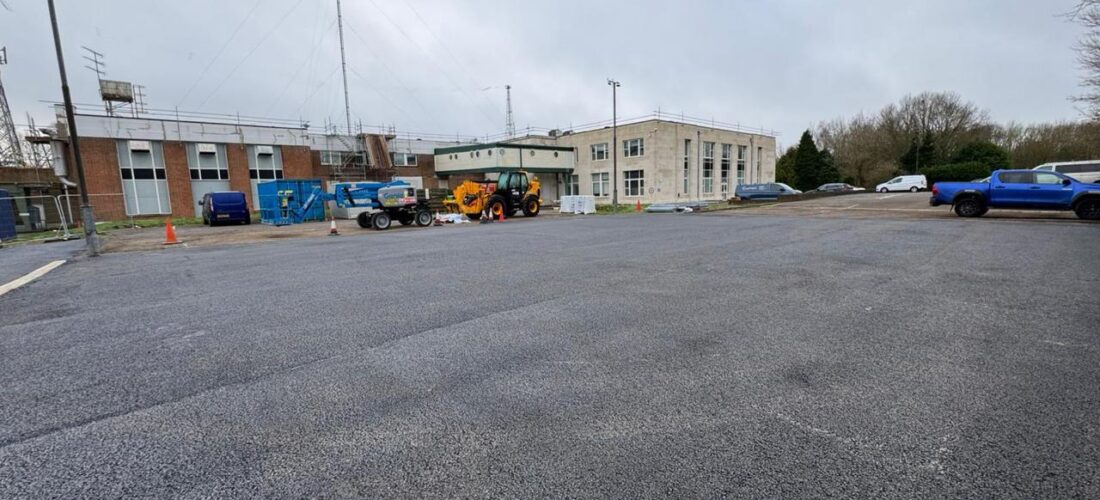
Road construction is not just about laying asphalt or block paving. It is a complex, multi-stage process where every element – from material selection to the smallest project details – plays a crucial role. Imagine the road you travel on every day. The same buildings pass by as they did yesterday, your gaze glides over the familiar urban landscape… But! If a pothole appears on the surface, it immediately catches your attention. Behind the smoothness and convenience lies the hard work of engineers, builders, and an entire team of professionals who have carefully planned every step.
Block paving, asphalt or tarmac, UK
The choice of materials is perhaps one of the most important aspects of road construction. After all, they determine how long and how reliably the road will last. There is a vast variety of materials, but we will focus on the most popular and time-tested ones.
Asphalt. The true star of road construction. In fact, it is the best option in terms of cost, installation speed, and overall performance. It is popular due to its smoothness, comfort, and relative affordability. Asphalt roads are built quickly and easily, making them an excellent choice in most cases. However, asphalt is not as durable as concrete. It is vulnerable to high temperatures and heavy loads, requiring regular maintenance and repairs. Another advantage is its versatility – asphalt can be laid not only on roadways but also in pedestrian areas.
Block paving. A true gem for pedestrian zones. It is not only aesthetically pleasing and diverse in design but also quite durable. Block paving is easy to install and repair, making it a highly practical choice. However, its cost is higher than that of asphalt, and laying it requires specific skills.
Concrete. It would be difficult to find a person anywhere in the world who is unfamiliar with concrete. This material is so commonly used that we often fail to notice its presence, yet it surrounds us everywhere – at home, at work, in shops, and even in barbershops, where walls and ceilings are most likely made of concrete and bricks. Naturally, we also encounter this material on many road sections. Concrete roads have been built for a long time, and today various technologies are used to make such road surfaces as durable, resilient, and comfortable as possible for road users. Concrete roads withstand enormous loads and are resistant to heat, frost, and aggressive chemicals. They are like true titans, ready to bear heavy loads for decades. However, there is a downside – building concrete roads requires significant investment, complex technology, and specialised machinery. Additionally, they generate considerable noise, which can be a nuisance for residents of nearby homes.
Asphalt or concrete?
Beyond these three key materials, other materials are also used in road construction. Crushed stone and gravel, for example, serve as the foundation for many roads. Natural stone paving is a timeless classic that never goes out of fashion. There are also modern alternatives such as modular plastic or composite materials.
However, when it comes to roadways, the choice usually boils down to asphalt or concrete. This decision is not always straightforward and often depends not only on the budget but also on future operating conditions. That said, one thing is certain – asphalt is more versatile.
Tarmac or block paving?
When selecting a road surface material, a common question arises: which is better – asphalt or block paving?
Economic benefits
Asphalt surfacing is generally more cost-effective than block paving. Asphalt requires less time and labour for installation, which also reduces the overall project cost.
Installation speed
Asphalt is laid much faster than block paving. This is particularly important for the construction of roads and motorways, where time is a critical factor.
Comfort and road safety
Asphalt provides a smooth and even surface, making driving comfortable and safe. It has excellent traction properties, reducing the risk of accidents. Asphalt surfaces also minimise noise levels from traffic, which is especially important in urban areas.
Versatility of application
Asphalt is suitable for roads of all types – from motorways to small residential driveways. It is also widely used for car parks, pavements, and other areas. Asphalt adapts well to various operating conditions and can withstand significant loads.
Planning – thinking ahead
Before starting road construction, everything must be meticulously planned. Engineers study the terrain, conduct geodetic surveys, and calculate traffic loads. They consider every detail to ensure the road is not only durable and long-lasting but also safe and convenient for all road users.
Construction: the magic of transformation
Then comes the crucial moment – construction begins. It is almost magical how a pile of materials and tonnes of earth transform into a new road. Builders use modern machinery to ensure the surface is laid evenly and with high quality. They monitor every stage of the work so that the road remains durable and smooth as paper.
We use the most time-tested construction methods while incorporating cutting-edge technologies. This approach allows us to create high-quality road surfaces, taking full advantage of modern construction techniques. In other words, we build efficiently, quickly, and reliably.
Maintenance and repair – the key to longevity
Even if all construction techniques are followed to perfection, natural wear and tear will occur, and roads may eventually require repairs. Therefore, road surfaces need regular maintenance, with cracks and potholes promptly sealed. Only through proper and timely care can roads retain their quality for years, as correct maintenance prevents further deterioration.



